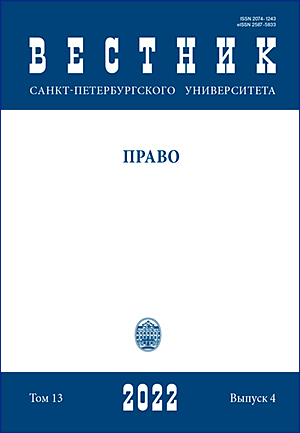The impact of foreign economic sanctions on commercial contracts
DOI:
https://doi.org/10.21638/spbu14.2022.408Аннотация
Foreign economic sanctions were in the focus of domestic lawyers’ attention for half a dozen years. The new legal regime for persons directly or indirectly involved in sanctioned cross-border commercial activities has been studied in science mainly in the context of public law, and — in the applied aspect — through the prism of compliance procedures. However, no less important is the problem of sanctions regulation in its embodiment in the private law instruments of contract law. The purpose of the study is to summarize and analyze the effectiveness of the accumulated practice of the use of pre-contractual and contractual mechanisms to manage the risks caused by foreign restrictive measures. To achieve the goal, general scientific methods of analysis, synthesis, generalization, as well as the comparative legal method and approaches of economic and empirical analysis of law are used. Following the presentation of the leading approaches of the Russian state courts to the legal qualification of economic sanctions, the most promising options to manage the risks of sanctions for business at the pre-contractual and contractual stages are studied. In line with best business practices, pre-contractual mechanisms of compliance procedures (external and internal compliance) as well as contractual ways to mitigate sanctions risks proved to be the most effective for alleviation of the sanctions burden. Both sets of measures are developed and introduced into the daily routine by business participants themselves. Contractual regulation makes a decisive contribution to reducing the degree of negative legal consequences for business. To effectively manage risk, representatives of the business community use a wide range of contractual provisions: sanctions clauses, force majeure clauses, currency choice clauses, applicable law clauses and arbitration clauses. The success of such contractual initiatives, strengthened by the development of standard forms and terms of commercial contracts, is confirmed by judicial and business practice.
Ключевые слова:
economic sanctions, sanctions compliance, sanctions clause, commercial contracts, legal risk management, contract work
Скачивания
Библиографические ссылки
Загрузки
Опубликован
Как цитировать
Выпуск
Раздел
Лицензия
Статьи журнала «Вестник Санкт-Петербургского университета. Право» находятся в открытом доступе и распространяются в соответствии с условиями Лицензионного Договора с Санкт-Петербургским государственным университетом, который бесплатно предоставляет авторам неограниченное распространение и самостоятельное архивирование.






